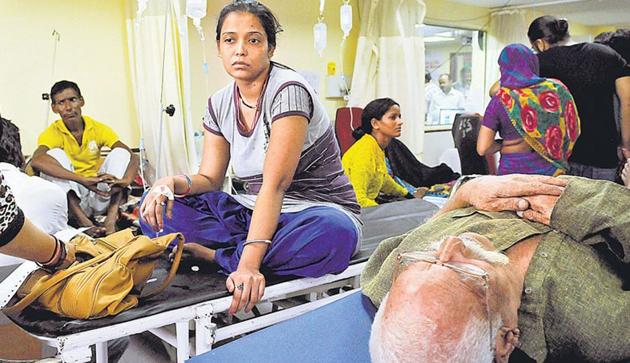Other states’ patients avail of free treatment in Delhi
In Delhi, 11 public and 7 private hospitals have signed up to treat beneficiaries from other states. Apart from the treatment cost, the scheme also covers the costs of medicines, consumables and implants, which are not free in government hospitals.
At least 1,150 beneficiaries of Ayushman Bharat–Pradhan Mantri Jan Arogya Yojna (AB-PMJAY) from other states have received free treatment in Delhi since the scheme, for which Delhi residents are ineligible, was launched on September 23, 2018.

The Delhi government has not signed up for the scheme that provides Rs5 lakh annual cover to the poorest 10 crore families.
In Delhi, 11 public and 7 private hospitals have signed up to treat beneficiaries from other states. Apart from the treatment cost, the scheme also covers the costs of medicines, consumables and implants, which are not free in government hospitals.
“The package rates are very low. It was possible for us to sign up for the scheme because we are a big hospital and we can afford to treat some patients at lower costs that are subsidised by paying patients. But it might not be possible for other private hospitals,” said Dr DS Rana, chairman of the board of governors, Sir Ganga Ram Hospital, which signed up for the scheme a week ago.
For Delhi residents, consultation, common medicines and diagnostic tests are free for patients in all government hospitals, but patients have to pay for specialised tests, such as MRIs, CT scans and medicines not listed in the state’s essential drug lists.
“Although we say treatment is free at government hospitals, patients end up paying for some tests, medicines and consumables. Even if the cost adds up to just Rs100, many patients end up compromising on nutrition to pay for treatment. Ayushman Bharat plugs these gaps,” said Dr Prateesh Rana, nodal officer for AB-PMJAY at Dr Ram Manohar Lohia (RML) Hospital.
Travelling to the hospitals, however, adds to the cost.
Chote Lal Ahirwar, 45, a construction worker from Chhatarpur in Madhya Pradesh, had to take his 14-year-old son to four hospitals in four cities — Chhatarpur, Jhansi, Gwalior and Delhi — before he was diagnosed with cancer of the chest wall.
The AB-PMJAY Golden Card helped him get the chemotherapy medicines free, but he had to borrow Rs2 lakh for the treatment, of which Rs18,000 the cost for hiring an ambulance to transport his son from Gwalior to Delhi.
“It would have been nice if AB-JAY also included the cost of the ambulance,” he said.
The registration criteria for AB-PMJAY requires a hospital to have an ambulance, but these services are not provided to transfer non-critical patients to other hospitals.
Almost 80% of the patients who received treatment under the AB-PMJAY at RML Hospital came for cardiac surgery, to replace a valve or place stents to open a blockage of heart vessels.
At AIIMS, cardiac, neurological and orthopaedic surgeries were among the highest performed under the scheme.
This is the reason for high claim amounts in Delhi hospitals. At both RML Hospital and AIIMS, Rs50,000 was claimed by each patient, much higher than the national average of around Rs15,000.
Delhi government hospitals, which are not a part of the scheme, have extensive medicine lists and tie-ups with private centres for the high-end diagnostics.
The Delhi government had rejected the scheme over nomenclature. The AAP government wanted to call the scheme ‘Mukhya Mantri Swasthya Bima Yojna-Ayushman Bharat’, but the National Health Authority wanted Ayushman Bharat in the prefix.
“The Delhi model is much better. The government organisations should ensure that the out-of-pocket expenditure goes down by ensuring the availability of medicines, consumables and tests within the hospital, rather than depending on insurance,” said Jayant Singh, of All India Patient’s Rights Group.
Apart from the patients, the hospitals also benefit from the scheme.“Government hospitals, anyway, provide free treatment to all patients, irrespective of their income. Now, the hospitals will be paid back some of the treatment cost,” said Dr Rajiv Garg, medical director of Lady Harding Medical College and associated Sucheta Kriplani and Kalawati Saran hospitals. So far, 300 beneficiaries have been identified at Lady Hardinge.
“We have not really monitored the implementation of the scheme in Delhi as the state is yet to sign up for the scheme, but in other states, there have been problems with identification of beneficiaries, especially if they have their names spelt differently in different IDs,” said Singh.




